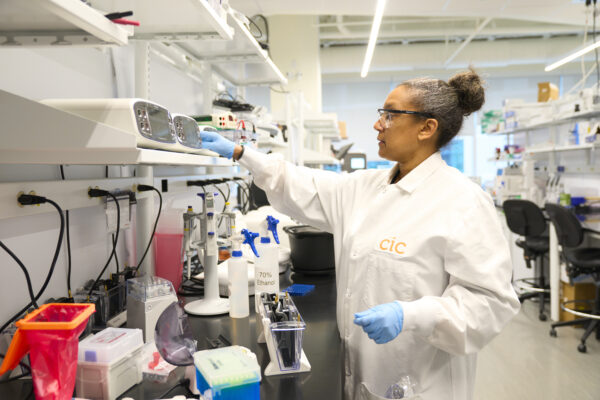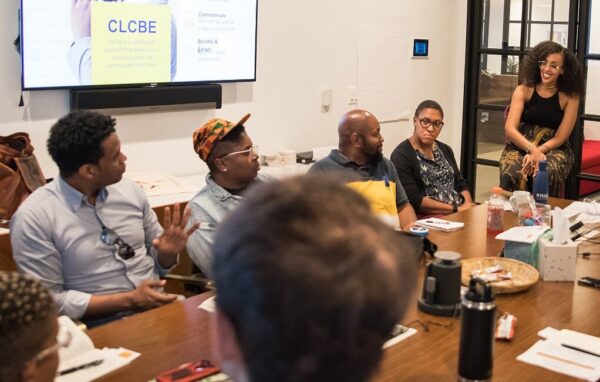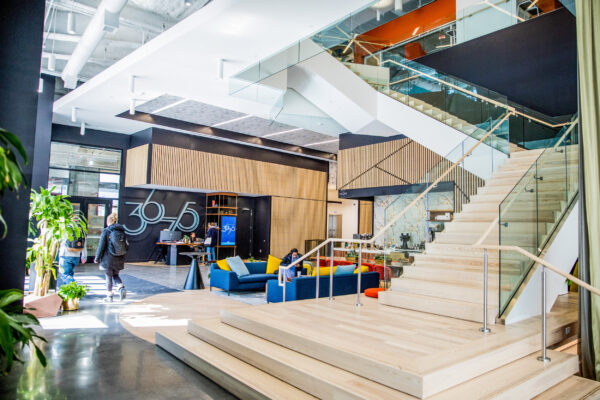CIC Philadelphia at 3675 Market Street will host a free breakfast and panel as part of Philly Tech Week.
On May 6, CIC Philadelphia will bring together four leaders from the tech and nonprofit communities for a panel discussion exploring what nonprofits and startups can learn from each other, and how to scale and implement new tools to create alternative revenue streams or funding structures.
The event—Lessons from the Tech Community: Developing Novel Revenue Streams for Nonprofits—is part of Philly Tech Week, a week-long celebration and exploration of the technology and innovation happening in the City of Brotherly Love and Sisterly Affection.
Panelists include:
-
Tracey Welson-Rossman, TechGirlz founder and Chariot Solutions CMO
-
Sylvester Mobley, cofounder of Coded by Kids
-
Jabari Jones, president of West Philadelphia Corridor Collaborative
-
Sally J. Guzik, CIC Philadelphia site director, as moderator
We interviewed Guzik, Jones, and Welson-Rossman about the idea behind this event and what participants could expect. Here’s what they had to say.
CIC: How did the idea for this panel develop?
Jabari Jones: In a very short time, CIC Philadelphia has become a thought leader here in West Philadelphia. Sally and her team are always looking to curate important conversations. When you think about the best ways to help Philly’s growing nonprofit and startup communities develop, you land upon some common answers. One of the best is helping them to develop innovative revenue streams.
Sally J. Guzik: Thanks, Jabari. This event was ignited by conversations I’ve been having with our nonprofit clients about how their means of funding can both limit and endanger them. They realize that depending upon any one source of income puts them at risk, and they want to learn how to create diverse revenue streams to broaden their opportunities and increase their financial stability.
Tracey Welson-Rossman: Sally and I both presented at SXSW, and she shared this with me when we were relaxing in the Philly booth there. I have a unique vantage point, because I live in the tech space and on both sides of the for-profit and nonprofit divide. From my perch, I see important similarities between these worlds and ways that leaders in both can learn from each other to increase their financial stability.
CIC: So is this event just for nonprofit leaders?
TWR: Emphatically no! Nonprofits can always learn business techniques from for-profit business, but for-profits can also learn from nonprofits.
JJ: In fact, we want to show that nonprofits and startups aren’t really so different. Many of the same principles that work in business can be applied to nonprofits in terms of developing diverse revenue streams. Likewise, startups can learn from nonprofits about quantifying impact and collecting data.
SG: It’s funny; nonprofits don’t tend to think of themselves as startups, yet their leaders very much model the resilience and creativity needed to be an entrepreneur.
TWR: Exactly. Nonprofits constantly have to do more with less. This requires creativity and ingenuity; for-profit leadership can learn a lot from this no matter where they are in the business cycle. I personally find inspiration and ideas in lots of different places and from many people and organizations. Just because someone works for a nonprofit, don’t assume they’re not creative about producing revenue.
SG: Yes! I’d say that anyone who has an idea they’re looking to scale, who wants insight into how to grow and develop their business, or who is looking for a way to gather unique perspectives will learn something valuable from this group of community leaders. Plus, they’ll have the chance to network with a room full of like-minded individuals and enjoy a really good, free breakfast by Lokal Artisan Foods, one of our community partners.
JJ: I agree. Entrepreneurs, startup leaders, and of course, nonprofit leaders should attend.
CIC: Why is it important for the tech community and nonprofits to see themselves as aligned?
SG: A lot of the nonprofit work that happens at CIC Philadelphia is related to workforce development—trying to secure the talent pipeline so this region can fulfill its potential as a tech and startup hub.
TWR: Anyone who is in the field right now understands that there is not enough help. In both tech and STEM, we are facing a critical shortage, which has been brewing for the past 15 years. The nonprofits you’re supporting with your [CIC] Social Impact Cohort and other workforce development nonprofits, like TechGirlz, must be aligned with the tech community, because we’re providing their future workforce, whether it’s immediate through work with college students or adults, or the long game we’re playing with TechGirlz. To address the talent shortage, we must be aligned with the organizations that have the best resources in terms of expertise, available time, and dollars.
SG: That’s exactly what we’re trying to accomplish with our Social Impact Cohort. By providing workforce development nonprofits access to our ecosystem, we’re creating connections and providing access to funding and other resources necessary for these nonprofits to thrive.
CIC: What are the similarities between the tech community and nonprofits that, once understood, can support the growth of both?
JJ: Startups and nonprofits are both businesses. And business is the science of building wealth by solving society’s problems. Startups do this by working on a novel idea with broad appeal, where nonprofits solve a social problem or a need. All businesses have to find ways to fund themselves, to solve a problem, and to prove to others that they are solving a problem. This includes being able to effectively communicate what the problem is by defining it and how they are solving it.
TWR: Both communities have to do more with less, so the question is: How do we accomplish that? We need to be creative about how we’re finding funding and understand how to get the most out of every relationship. It’s critical to understand why an organization is motivated to work with you, whether that organization is nonprofit or for-profit.
CIC: You call this event “Developing Novel Revenue Streams for Nonprofits,” but couldn’t it just as easily be called “Developing Novel Revenue Streams for Tech Startups?”
JJ: It absolutely could. The principles of revenue and innovation are the same between them.
TWR: Exactly! That’s the point; it’s just being creative. A novel revenue stream for TechGirlz is the Women in Tech Summit. We’re able to check so many boxes with that summit: we reach the women’s community, we provide value to companies looking to recruit for diversity—who pay us sponsorship money for helping them reach the women’s community, and we always get new volunteers and corporate supporters who are learning and getting excited about TechGirlz for the first time at the summit. Sponsorship revenue from the Women in Tech summit has become our largest revenue stream and allows us to keep our educational materials free.
SG: That’s amazing. Our hope is that hearing stories like this one on May 6 will spark ideas among the participants, regardless of whether they lead a nonprofit or a tech startup. It’s not hard to imagine how such an authentic, multi-pronged approach could be applicable in both worlds.
CIC: What do you hope people will gain from attending this panel discussion?
TWR: I hope they open up their minds to think about creative, non-traditional ways of looking for funding sources if they’re a startup and other ways of producing revenue if they’re established.
JJ: By the end of the discussion, I hope everyone attending is thinking innovatively about ways to develop revenue streams.
CIC: Please share your top piece of advice for those who can’t attend.
TWR: One way to think of novel revenue streams is to really understand the relationships you already have. Think about how you can nurture these partnerships and alliances into potential funding streams by really understanding what the goals are for both sides in each relationship.
JJ: Always be focused on quantifying your impact, because funders, from investors to philanthropic foundations, use impact as part of their decision-making process. As a nonprofit, what’s the impact you’re making to improve the lives of those you serve? As a startup, what impact are you making in people’s lives that validate them supporting your product or using your service?
This breakfast event takes place on Monday, May 6, 2019 at 8:30–10am at CIC Philadelphia. Attendance is free and open to the public. An ASL interpreter will be on site.






